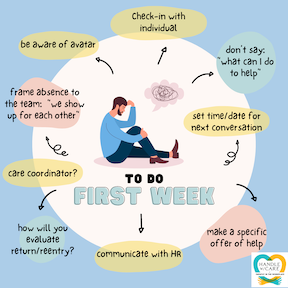You Shouldn't Be Here: Tips for the First Week
/She needed to be on bedrest if there was any chance for the baby to survive.
I listened to the story over brunch. Three decades separated our moment from the story that this man was telling me but the memory vibrated with emotion.
This was their first child and, when they got the doctor's news, they were compliant and hopeful.
Weeks of bedrest passed as they quietly willed the baby to live and thrive.
However, in the end, the damage was already done. Their daughter was born nine weeks later and only lived for a handful of days.
"You shouldn't be here"
After a few heavy days of sadness, spent comforting his wife and arranging the many details that accompany death, he was back in the office, a young partner at a large law firm where billable hours were king.
He shuffled papers at his desk, trying to wrap his mind around the tasks that piled up while he was keeping vigil at the hospital.
The receptionist paged: "He wants to see you in his office."
"He" was the founding partner, the one with the name on the building and the letterhead.
My friend entered his large office and sat down.
"You shouldn't be here," the partner began.
And, as my friend tells the story, he remembers the indignation and sadness that welled up inside:
"I mean, I'd had a really hard stretch of time and here he was, firing me on the first day that I got back..."
But his thoughts were interrupted as the boss continued.
"You've come back to work too soon. The place where you need to be is with your wife, at home."
The boss slid a voucher across the desk.
"We've taken up a collection and gotten you this voucher with a travel agency. I want you to go and take a trip, get away with your wife for awhile and then come back to work."
"I will never forget"
"I will never forget his kindness. I spent most of my career at the company and I know that moment has something to do with it," he concluded as I finished my crab cakes with tears in my eyes.
This same man is now grey-haired, a leader of his own organization. A woman on his staff recently buried her child.
"We aren't a big law firm and didn't have the budget to send her away on a trip, but I encouraged her (and her husband) to go use my lake house so they could have some time to recover."
Gestures of meaningful care have impact far beyond the moment.
The first week
Work is busy, plagued by the tyranny of the immediate, and it is easy for our best intentions to get lost. One of the things that I love about this story is that the leader of the firm took time to offer a meaningful gesture of care.
He didn't say, "I'm here for you; let me know what I can do to help."
Instead, he considered what he could give and made a specific offer. He also reallocated work in order to make it a possibility.
In the above graphic, you'll find some helpful prompts for your consideration in how to help during the first week to get you thinking about how this can look at your organization.
Podcast Recommendation
Motherhood is messily bound up in our concept of what it means to be female in the world...and it is still top of mind for many of us with Mother's Day falling just a few days ago.
This podcast episode from the Handle with Care vault probes topics of loss and femininity and post-traumatic growth…and how you can help someone going through this sort of pain.
Megan Flinn lost her life-long hope of being a biological mother when her uterus was unexpectedly removed during surgery.
Her deep disappointment and wrestling profoundly impacts her work as a doctoral candidate, counselor, and non-profit founder.
“Survival and goodness is available, even in those dark places.” If you have experienced (or know someone who has) unexpected loss, this episode is for you.
Book Recommendation
I 100% recommend this book. I'm halfway through and the margins are full of my notes. Dr. Hillary McBride masterfully weaves stories and insights together in this compelling work that had me in tears just this morning.
Bonus - each chapter ends with helpful prompts for reflection and embodied practices for growth.
Here is a bit of the Amazon blurb:
The Wisdom of Your Body offers a compassionate, healthy, and holistic perspective on embodied living. Weaving together illuminating research, stories from her work as a therapist, and deeply personal narratives of healing from a life-threatening eating disorder, a near-fatal car accident, and chronic pain, McBride invites us to reclaim the wisdom of the body and to experience the wholeness that has been there all along. End-of-chapter questions and practices are included.

